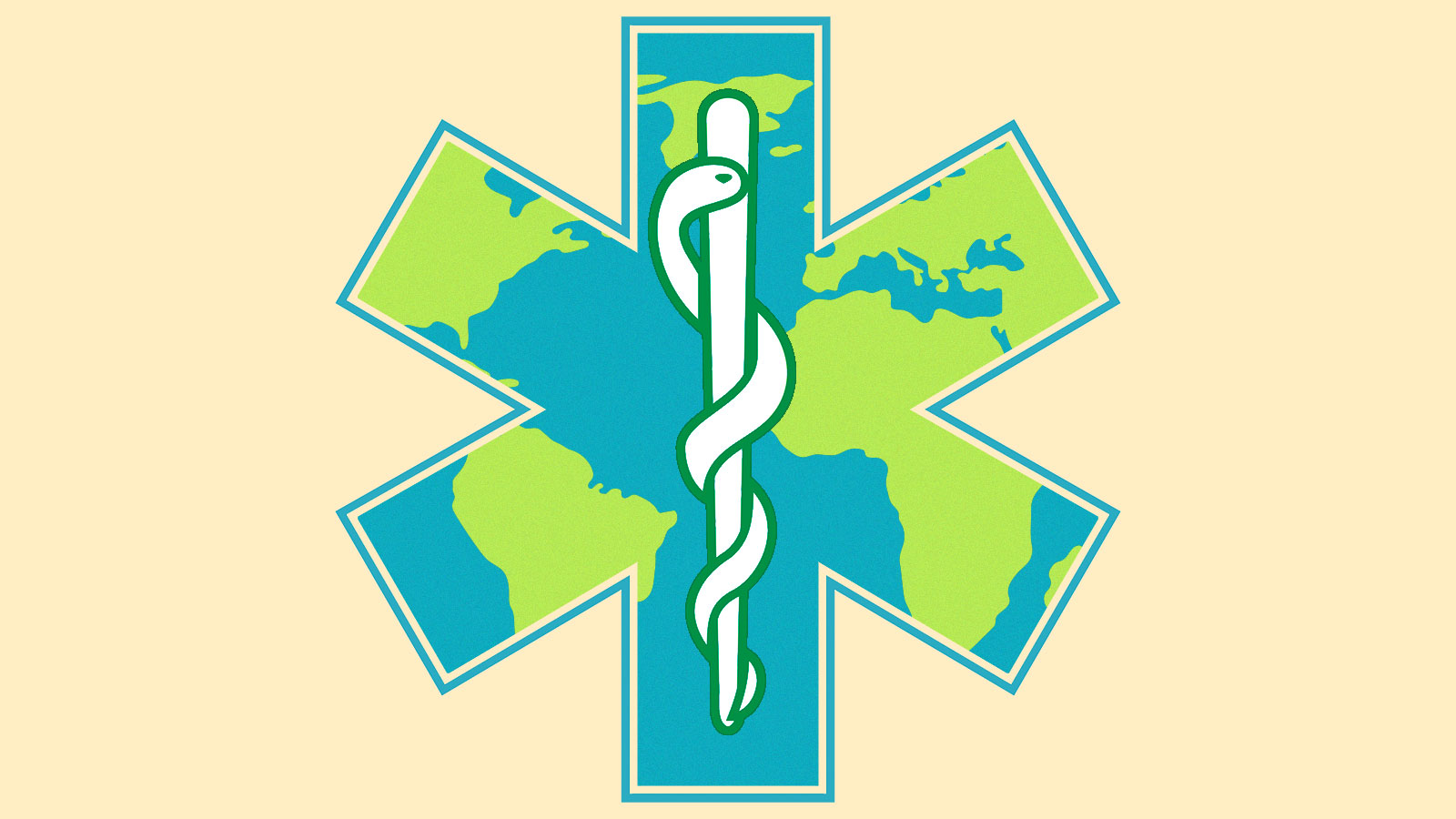This coverage is made possible through a partnership with Grist and WABE, Atlanta’s NPR station.
Emory Medical School’s administration is making climate change a formal part of its curriculum.
It’s the culmination of several years of student-led efforts to ensure Emory’s future doctors learn about the growing health impacts of a warming planet, because climate change doesn’t just bring hotter weather and more extreme storms. It also makes many health issues worse – issues doctors need to recognize and treat.
“As we were going through our lectures, in our first year, we noticed that there really was no mention of some of the health risks of climate change,” said Ben Rabin, now a fourth-year medical student at Emory, located in Atlanta.
He and classmate Emaline Laney raised this concern, and got to work. They went through the first- and second-year medical school curriculum to find places to weave in climate change.
“For example, we learn a lot about kidney injury, and kidney failure,” Rabin said. “So we wanted to talk about what are some of the risks of extreme heat?” It’s easier to get dehydrated when it’s very hot, he explained, and that can lead to kidney failure.
They found plenty of topics, because climate change affects health in so many ways: extreme heat linked to preterm birth and low birth weight, air pollution driving strokes and asthma, mosquito-borne diseases, not to mention the mental health impact of worsening hurricanes and wildfires.
Working with faculty, Rabin and Laney developed a curriculum proposal that contextualizes what students learn anyway with the added risks and impacts of climate change.
“We were really specific about, we think that this should be something that all students have a chance to interact with,” Rabin said.
Schools across the country are increasingly reckoning with the need to teach the intersection of climate change and health.
Schools of public health have been on the forefront of that progress, according to Dr. Georges Benjamin, executive director of the American Public Health Association. Johns Hopkins University established an Environmental Health Institute at its school of public health in 2007. There are similar climate change centers at the Yale, Harvard, and University of Washington schools of public health.
But more recently, medical schools have joined in the shift, updating curriculum and launching special programs to teach future doctors about the climate change-health connection.
In 2017, Columbia University launched the Global Consortium on Climate and Health Education. It grew out of the COP21 conference in Paris in 2015, where a special session highlighted the need to study and plan for the health impacts of climate change. The consortium develops best practices and educational trainings for teaching climate change. It counts 47 medical schools in the United States as members, among more than 240 schools of medicine, nursing, public health, dentistry, and veterinary medicine worldwide.
And in 2019, the American Medical Association endorsed the teaching of climate change and health in “undergraduate, graduate, and continuing medical education.”

The push to educate future doctors about the risks of climate change is happening as those dangers come into ever-sharper focus. The latest report from the Intergovernmental Panel on Climate Change, or IPCC, finds that the prevalence of climate-related illnesses, premature deaths, malnutrition, and mental health impacts is increasing. By 2050, it predicts more than 250,000 climate-related deaths per year “just due to heat, undernutrition, malaria, and diarrheal disease.”
Opportunities for doctors and medical students to learn about the risks of climate change have existed before now. But they mostly happened within specific classes, lectures, or tracks of study, rather than being a central component of medical schools’ teachings.
At Emory, for instance, climate change was part of the curriculum for residents who chose the Pediatric Global Health track. But that program only hosts about a dozen residents each year, out of about 140 in each class at the medical school as a whole.
“Progress has previously felt a little slow and ad hoc,” said Dr. Becca Philipsborn, the faculty advisor for Emory’s new climate effort. “Now, there is momentum that seems to reflect a shared recognition that climate change matters for the health of our patients, for clinical care delivery, now.”
Philipsborn said incorporating global warming into the existing curriculum made sense because it’s “core knowledge,” not a separate issue.
She credited students for leading the effort.
“I would not have thought as a still-junior faculty member to go to the med school and say, ‘This is what we need to be teaching the students,’” Philipsborn said. “But the students had that vision, they came forward with the demand and said, ‘This is the greatest health challenge of our time, we need to be learning about it.’”
Benjamin said students often drive changes like this. They’ve pushed schools to better address racism and to incorporate telemedicine. And they’re leading the charge in pushing other medical schools to teach climate change, including at Stanford, Tulane, and the University of California, San Francisco.
Benjamin said it’s especially important to teach this early in a doctor’s career.
“You can get physicians to be a little more holistic in their approach, and recognize these social determinants make a difference,” he said.
And he said it’s about more than just better treating patients.
“Physicians are influential in their community. And so making sure they understand that [to] connect the dots for human health, is important,” Benjamin said.
That’s exactly what second-year Emory med student Irene Liu is hoping – that recognizing and discussing health impacts of climate change in the doctor’s office can drive bigger changes.
“I think that raising awareness to our patients about how air pollution and warming and wildfires are affecting your health and your children will have rippling effects,” she said. “I think I’ll hopefully motivate members in the community.”
Having these discussions in med school has had that effect on Liu. She called it eye-opening.
“It made me realize that there’s nothing within our health system that climate change doesn’t touch,” she said.



